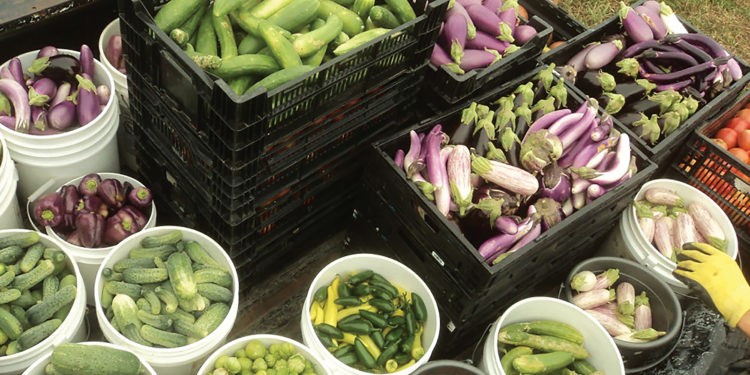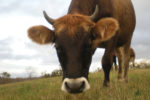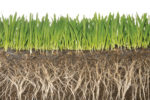The Healthier Planet

Delicious & Dedicated
It was by complete accident that I discovered Fair Share Farm. I ran into co-owner Tom Ruggieri at the opening of Gladstone’s Feed Supply Market and Deli a few months ago. I’m so glad I did. Turns out, Ruggieri and his partner, Rebecca Graff, have been cultivating Fair Share Farm for 16 years. The two left their jobs and were looking for ways to support and promote the community, produce sustainable agriculture, promote healthy eating habits, and provide them with an income. The farm, which occupies land that’s been in Graff’s family for four generations, was the answer.
“When we came back, no one had been living on the farm for more than 20 years. There were outbuildings, but half of them had collapsed. The house hadn’t been lived in for many years and needed a lot of work. We had my grandpa’s old tractor that my dad also used in the 60s and that we’re still using today,” Graff remembered. “We had some infrastructure that had a lot of potential, but the farm itself needed a lot of attention.”
The couple approached the project with passion and vision. They decided from the beginning they would do things the right way for the farm, the land, and the planet. “It took us a while. The land had been farmed conventionally, you know, just kill off the soil life. There wasn’t a lot of life in the ground. We were growing cover crops and they wouldn’t even germinate. The first few years were pretty tough transitioning from conventional crops to an organic vegetable system,” Graff said.
And, Graff and Ruggieri didn’t stop at growing their vegetables organically. They also dived head-first into the issue of carbon sequestering. It’s a term and practice I was unfamiliar with and has become an integral part of Fair Share Farm. “The source of the organic matter added to our soil is the carbon in the air. Carbon dioxide is turned into plant matter by photosynthesis. When we grow and turn under a cover crop, the carbon incorporates into the soil. Removing carbon from the atmosphere and putting it in the soil is called sequestering. Since 2008, we have sequestered an average of over 75,000 pounds of carbon dioxide per year,” Ruggieri stated.
On Fair Share Farm’s website, you will find an impressive list of practices Graff and Ruggieri adhere to.
Here are some that stood out to me:
• We maintain and build healthy soils through biological farming practices that include: cover cropping, compost application, extensive mulching, rotating crops annually, rotational grazing, and reducing tillage.
• We irrigate our fields from an on-farm surface water pond using a 1400 watt solar panel system and a Grundfos submersible pump.
• Our greenhouse is passive solar design, partially earth-bermed, and containing over 50 black barrels filled with water for heat storage. This design reduces heating costs during late winter and early spring when we are growing our transplants.
• The electric power for the farm is Missouri wind power purchased through the Platte-Clay Electric Cooperative’s Green Power Program. Since 2004 all electric power purchased for the farm has been associated with this program. This has accounted for a reduction in carbon dioxide emissions for the farm of over 400,000 pounds since January 2004.
• We manage our fields to create beneficial habitat for wildlife and encourage diversity.
• Our passive solar greenhouse, solar-powered irrigation system and electric tractor all serve to reduce the farm’s carbon footprint.
• We conserve natural resources by reducing erosion and pollution of air, soil, and water, through responsible farming practices.
• We reject the use of synthetic insecticides, herbicides, fungicides, fertilizers, GMO’s and chemically treated seeds.
The life’s blood of Fair Share Farm is Community Supported Agriculture where farmers and consumers join forces. “We grow a large variety of vegetables for CSA. At our peak, we had 150 members. We’re at 100 members now,” Graff said.
Fair Share Farm grows some two dozen items from tomatoes to turnips. Shares consist of six to eight items every other week for 16 weeks from mid-April to mid-November. The items vary from week to week and season to season. There are four distribution sites where members can pick up their shares: Fair Share Farm, Liberty, Midtown Kansas City, and Brookside. The cost for a season of veggies is $375. To find out more, or to sign up, visit Fair Share Farm’s website at www.fairsharefarm.com.






